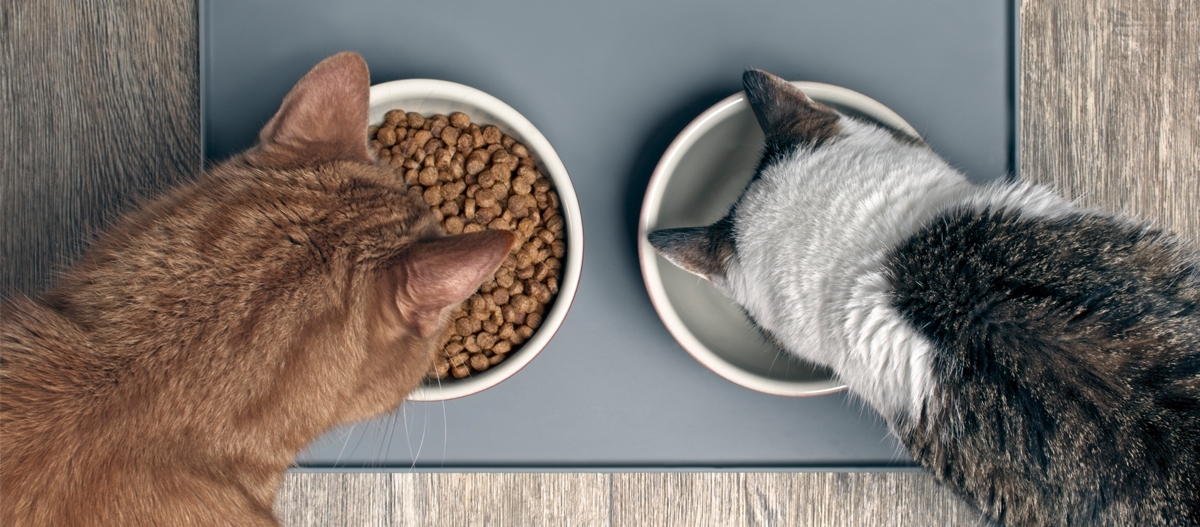The fundamental question: What food does the cat need?
If you were to make a list for the question "What are cats allowed to eat?", meat would of course come first. A cat's natural food spectrum consists almost entirely of animal food, which it preys on when hunting small mammals, birds and fish as well as small amphibians and reptiles (such as lizards), depending on availability. By the way, a cat that hunts its own food also consumes a little plant matter (via the stomach contents of the prey).
To care for a domestic cat, provide the animal with high-quality cat food in which ingredients including trace elements and supplements are optimally tailored to the needs of the animal. Detailed information about wet food, dry food and snacks awaits you when you read our guides.
Away from cat food: What can cats eat?
In addition to cat food, which would in principle be sufficient as a complete food, there are a number of foods that cats are allowed to eat.
Tastes are different depending on the cat's personality:
- Fresh meat (except pork), cooked or fried without spices
- Fish (remove bones, never raw freshwater fish)
- Vegetables, boiled or steamed (see below for exceptions)
- Fruit such as melon, apple slice or berries (see below for exceptions)
- Dairy products such as quark, yoghurt (unsweetened) or hard cheese (no milk!)
- Egg, boiled or as unseasoned scrambled eggs (never raw!)
This list is not to be understood as a feeding instruction, but as an overview of what can be used to enrich a cat's diet - if it likes the respective taste at all. The foods mentioned are not indispensable for a balanced diet - apart from meat. However, lactose-free dairy products such as a spoonful of natural quark can serve as a valuable source of protein.
There is also talk of mini portions and unseasoned and unsweetened dishes. However, you don't have to be too worried if the tiger steals a small portion of prepared vegetables from your lunch from your plate once – it's more important that the cat doesn't eat anything that harms it.
"Unhealthy" from the human table: The cat doesn't get that
Many foods that are part of the normal diet of a "can opener" are harmful to the cat. So what are cats not allowed to eat? The following list lists foods that the cat should keep its paws off of.
Even small portions can lead to serious health damage.
- Rollmops: It is fish, but indigestible due to the high salt content.
- Avocados: The fruit contains persin, which can cause shortness of breath, oedema and heart muscle damage.
- Tomatoes, aubergines, raw potatoes: The nightshade family contains both atropine, which can cause cardiac arrhythmias, and solanine, which triggers cramps and breathing disorders in cats.
- Legumes and cabbage: Cats can get painful flatulence from this, although the danger comes primarily from raw materials.
- Onions, leeks, garlic: The spicy vegetable plants contain sulphur compounds that are toxic to cats. To be on the safe side, cat owners should avoid chives as a kitchen herb in flower pots.
- Baked goods of all kinds: Cereal products are not part of a cat's food spectrum; many animals are sensitive to gluten.
- Sausage, smoked or marinated meat: Too much salt and spices are also added to such meat preparations.
- Pork: Cats can become infected with the so-called Aujeszky virus, especially through raw pork. This can result in inflammation of the brain and spinal cord.
- Milk: Adult cats cannot metabolize lactose. There is a risk of diarrhea and painful abdominal cramps.
The problem with these foods is that the fishy and meaty products are quite desirable for cats and the danger of fruit and vegetable products - precisely because they are part of the healthy diet for humans - is underestimated.
However, here, too, it is the quantity that makes the difference: If the cat has caught a tiny bite once when it has tried the "human food" out of curiosity, there is usually no immediate risk. However, if the animal has eaten several times or questionable amounts of the taboo foods, you should seek the advice of a veterinarian.

Thorsten Nilson/500px Plus via Getty Images
A case for the veterinarian: What is poisonous for cats?
A frequently asked question is: Can cats eat chocolate? No, chocolate is highly indigestible for cats. The candy and also related products such as cocoa contain the substance theobromine, which can trigger cardiac arrhythmias, muscle tremors and cramps even in small doses. Since cats may not perceive the taste "sweet", but are quite interested in fat, you should never leave chocolate products unattended.
Raisins and grapes or their ingredient oxalic acid continue to pose a particular danger. Even in small doses, this can lead to kidney failure.
Human beverages such as alcohol (ethanol – leads to severe liver damage) and tea or coffee (caffeine, theine, theophylline – toxic even in small quantities) are harmful to cats. Of course, no cat owner would probably fill his furry friend's bowl with coffee or beer; on the other hand, it is conceivable that a cat bites a brandy or espresso praline out of curiosity.
Immediate veterinary help is finally necessary if the cat has ingested medication or pesticides such as slug pellets as an outdoor cat due to any circumstances: Different variants of the product are also toxic to cats.
Whether outdoor cat or sofa lion: Last but not least, it becomes risky when the cat chews on certain indoor or garden plants. It is therefore advisable to make the parlour and garden cat-proof from a botanical point of view.

Comments
Post a Comment